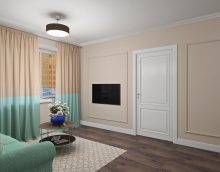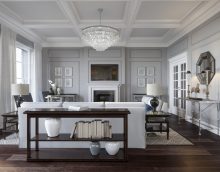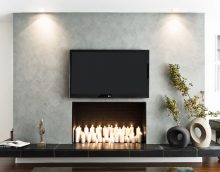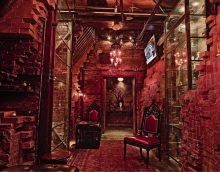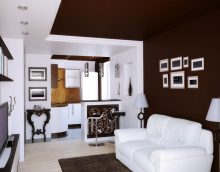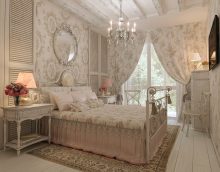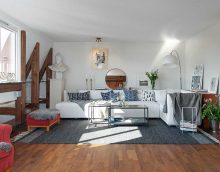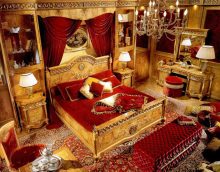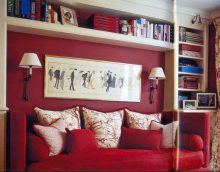Rococo style in the interior: history, features
Luxury, brilliance, sophistication, pretentiousness of the bends similar to a sink - this is how Rococo style in the interior is characterized. The name in translation from French means - “shell”, “shell”, “curl”. You can relate to him in different ways, but from the 18th century to the present he finds his fans.
Content
History of style
He is considered a continuation of another direction in art - Baroque, which at the beginning of the XVIII century was in crisis, decline. Both directions - baroque, rococo - are characterized by splendor, an abundance of elegant details, the difference is that rococo is more tender in color. It arose in art (for the most part - in the design of residential buildings of the nobility), filling the aristocratic salons and houses with charm. In addition to the interior, the style was reflected in architecture, music, poetry, but in interior design it continues to exist until now, albeit not as actively as 300 years ago.

Beautiful rococo style room design

Rococo style in the interior

Tree in the interior of a rococo style room
Compare the Rococo and Baroque table will help:
| Style traits | Baroque | Rococo |
| Are common | - tension;
- ostentatious luxury; - dark shades; - a combination of realities and illusions; - expressivity |
- lightness;
- sophistication; - light colors; - departure from reality; - pretense |
| Architecture | - scope;
- strict features, symmetry; - curved lines; - play of light and shadow |
- pretentiousness;
- lightness; - soft forms; - asymmetry of parts; - a lot of curly elements, curved lines |
| Interior | - large rooms;
- large details (frescoes, sculptures, gilding); - color contrasts; - massive furniture; - expensive fabrics |
- small rooms;
- thin carving, stucco molding; - lack of contrast; - gentle tones; - elegant, light furniture |
| Fashion | - splendor;
- a lot of jewelry; - unnaturalness; - maturity |
- grace, refinement;
- harmony; - youth |
| Art | - dynamism;
- vivid characters; - bright stories |
- playfulness and flirty;
- shepherd's motives; - naked bodies |
Appearing in France during the regency in the first decades of the XVIII century, the new style reached the peak of development under Louis XV, was widespread not only in the French capital, but throughout Europe until about the 80s of the XVIII century. The nobility received guests in the beautifully decorated, with a claim to sophistication, living rooms, ceremonial halls, but by the end of the 18th century the splendor and playfulness that prevailed in art and life gave way to strict classicism.
The development of the Rococo style was influenced by the traditions of oriental culture - in particular, the Chinese, the so-called chinoiserie style. The traditions of Chinese porcelain, delicate elegantly written plots are reflected in the decor, decoration, utensils.
It is believed that a new life was given to the Rococo style by a passion for oriental cultures that awakened with new force. Once again, the Chinese theme at the peak of popularity, which brought to life the fashion for creating stylized interiors of suburban mansions, studio apartments, halls of public buildings.

Rococo style kitchen design

Pictures in the interior of the room in the rococo style
Styling features
The modern Rococo style interior differs from the one that dominated the palace halls and personal boudoirs of aristocrats three centuries ago. However, the main, main features are the insignia of the style to this day:
- gentle pastel colors, combining with each other or with a snow-white color, gilding;
- a lot of sculpting, it is present on the walls, ceiling, decoration of windows, portals;
- expensive textiles, luxurious designs on fabrics;
- design of all surfaces: wall painting, rich ornaments, carving, gilding on furniture;
- many decorative things: elegant watches on the fireplace, candlesticks, candelabra, figurines, vases, painted porcelain dishes.
Rococo style is characterized by special patterns - curls resembling a shell, an auricle (they gave the name to the style). Elegant furniture on thin legs of curved shape complement the interior, lush textiles on the windows, decorated with lambrequins, tassels.
The main difference between the Rococo style and the others is its great decorative richness. Recognizable elements typical for the decor:
- rocaille (sea shell - used for interior decoration, furniture, decor items);
- cartouche - it is used to decorate walls, furniture;
- figures, images of angels;
- Floral motifs, themes of love in the drawings.

Bright rococo design

Beautiful rococo bedroom

Chic rococo bedroom design
Rococo style in the interior
The design does not dictate special requirements for the room, therefore, in the rococo style, spacious halls of suburban mansions, small living rooms, offices, offices and public buildings - restaurants, hotel lounges are decorated.
High ceilings, a spacious area, a special shape of the room are not necessary - any, even a small room can be decorated successfully.
Before decorating surfaces - walls, ceilings - you need to consider the general appearance, starting from decoration, painting, complemented by stucco molding, to furniture and arrangement of decor details. They need to be harmoniously distributed throughout the room so that the room does not look cluttered, like a museum.
The mural is complemented by ceiling, ornate patterns of fabrics - on curtains, sofas and armchairs. Motives of a man’s love for a woman, angels, the image of the vault of heaven - themes characteristic of the Rococo style are still present in design. Floral images are the most realistic, precisely painted or decorated with gold silhouettes. Luxurious chandeliers, mirrors in lush frames - an indispensable attribute of the interior.

Rococo style bedroom design

Beautiful rococo living room design
Rococo color palette
The modern house in the Rococo style is not as bright as in the XVIII century, it has less theatricality, pomp. For most rooms use a white-gold range, for the bedroom sand, cream, light green tones are often used.
Pastel colors are the basic shades inherent in the Rococo style:
- snow-white with gold;
- blue, white;
- delicate green combined with light pink;
- light colors - blue, pink, green;
- cream, gold.
Such combinations are characteristic of Rococo three centuries ago, and now they are popular in the reconstruction of the interior. This differs from Rococo Baroque with its rich, deep color palette.

Rococo style in the interior

White color in the interior design of the bedroom in the rococo style

Rococo style living room design
Room decoration
We have already talked about the need to think through all the decoration of the room down to the smallest detail before starting the finishing work. To decorate wall surfaces, their entire area is divided into sections, each of which is filled with a certain type of decor. Segments can be separated from each other by stucco motifs.
There are many options for wall decoration:
- painting walls with pastel matte water-based paints;
- velor wallpaper with a pattern, patterns of suitable design;
- murals, decoupage - will help create an imitation of painted walls;
- the modern trend is airbrushing, with the help of which you can recreate unique images resembling a painting of historical rococo (the picture is covered with several layers of varnish, which makes it durable).
Plaster sockets, cornices, stucco elements can be replaced with modern lightweight materials. To separate segments, highlight decorative paintings, you can use golden moldings.
Often they use the technique of horizontal wall separation - the bottom is decorated with wallpaper, paintings, tapestries, mirrors in carved frames are placed in the upper segment.

Black color in the interior design of the bedroom in the rococo style

Rococo style house design
Not only the walls, but also the ceilings designed the historic rococo exquisitely. For their design, you can apply:
- painting with light pastel shades or white;
- decoration - patterned cornices, fillets are fixed around the perimeter, and in the center there is a socket, a richly decorated crystal chandelier is placed on it.
- division into sectors, painting, airbrushing - traditional motives: sky, angels.
High ceilings are decorated with painted, various stucco moldings. There should be many stucco elements - both in the center and around the perimeter of the room. They divide the ceiling into sections, conceal the transition from walls to the ceiling, decorate the center.
Do not forget about the necessary elements - shells, cartouches, curls. Gilded convex decorative elements on walls and ceilings are appropriate. Stucco molding can be decorated door and window openings, columns, arches.
For the floor choose parquet, tile. An important requirement is gloss, gloss. Suitable in living rooms, large halls and cabinets, in the bedroom on the floor - carpets.

Rococo style living room design

Dark rococo style room design

Light colors in a rococo style interior design
Rococo furniture
Furniture in this interior saturated with decorative elements does not have to be strict; it is harmoniously “fit” into the interior. Rococo is characterized by the absence of bulky furniture, huge sofas, wardrobes and even more so - wardrobes. All furniture is selected small, comfortable:
- small sofas;
- couches;
- chairs and armchairs with high backs;
- dressers, dressing and coffee tables.

Golden hue in interior design in the rococo style

Chic rococo style interior design
A secretary, a small dresser, a cardboard box will fit harmoniously into the interior. In the living room, bedroom, study, you can put a small sofa. The furniture has curved legs, headboards, and backs. Carving, inlaying with gold, painting - elements that distinguish Rococo furniture. The facade, chest of drawers, a coffee table can be decorated with your own hands - using decoupage technique.
Upholstered furniture can have silk or satin upholstery with oriental or floral ornate ornament. For furniture, it is better to choose a natural tree.
The bedroom should definitely have a “royal” wide bed with a rich headboard - plant patterns, rocaille, curls - necessary design elements. Be sure to have a large mirror in a twisted gilded frame, a dressing table with a soft satin ottoman, small canapes, chairs. The bed can be decorated with a luxurious canopy, raised to the podium. She is the central subject in the room.

Rococo Design

Rococo style in interior design

Rococo Design
Textiles and Decor
There are a lot of textiles in the Rococo style - from its use for wall decoration, furniture upholstery, to decorative pillows, curtains on the windows - luxurious, multi-layered with rich lambrequins. This is an indispensable element of style.
The color scheme is selected in one tone, contrast in the textile decoration of the interior of the Rococo is not expected. Heavy fabrics that hold drapery drapery well - for windows, dense shiny - for upholstery of sofas and armchairs, pillows and bedspreads. Fabrics can be with a pattern - floral, patterned, or plain, with stripes.
The decor is arranged harmoniously in space, without overloading any one corner or segment of the room. All things - floor, table vases, figurines, porcelain services, candlesticks and candelabra are decorated with gilding, rocailles, curls - they say, but do not shout about luxury. You can put a clock in a bronze case on a dresser, fireplace, dressing table, depicting a couple in love, a girl, a lady or cupids. A large painted vase can decorate the hall, stairs leading to the second floor. In the cupboard behind the glass doors in the living room or dining room, place a set of fine porcelain with paintings.
Walls can be decorated with paintings, tapestries - in the event that there is no painting on them.

Chic rococo style interior design

Turquoise color in the interior of the room in the rococo style
Crystal chandeliers hanging in the center, decorated with an openwork rosette, are required in the rooms. It is possible to separately supplement the room zones with floor lamps, wall sconces. Lighting devices can be made of gilded metal or have a bronze base. The lamps with candle lamps will give a special flavor. And put similar candlesticks on the fireplace, chest of drawers.
Creating an interior design in the rococo style is exciting. Style, on the one hand, showing luxury, on the other - pastel, delicate tones. The abundance of painting, gilding and - light colors, a few pieces of furniture. Absorbing historical notes and complemented by modern materials, the Rococo style will inspire you to a unique interior in a country house or city apartment.
Video: Rococo style in interior design


















































